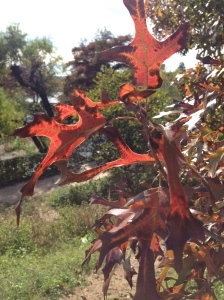With Thanksgiving still resonating, one week out, I find myself pondering matters of gratitude and thankfulness. In the context of the BRCA mutation and elevated risk, it boils down to this question – “Am I glad I know?”
Four years and three months ago, we had no clue that anyone in our family might be affected by hereditary breast and ovarian cancer. Then my mother (who had already had breast cancer) got ovarian cancer.
Fast forward ten months.
On a Thursday, I didn’t know that I carried a BRCA2 mutation. The next day, Friday, I did.
So – can I say I am thankful that I know?
To state the obvious: if I could magically repair this mutation, I would do it in a heartbeat. I am not in any way glad that I and others in my family are BRCA+. But the genetic error at issue was there – in me, my mother, possibly other family members – from our conception. That is biology. And given that fact, I would rather know than not know. So yes, I am thankful.
I am grateful for the scientists and medical doctors who did the research leading to these genetic tests and who continue to explore the implications of these mutations. The BRCA1 and BRCA2 genes were only discovered 1994 and 1995. Much has been learned since then but there is still a long way to go.
Knowing – for me, for our family – is better than not knowing, here. Though some days I might be tempted to say the opposite, almost wishing the to be blissfully unaware. Those moments though, however heartfelt, are brief and fleeting.
Because knowledge is power, as Francis Bacon famously wrote way back in 1597.
For my mother, knowledge of her BRCA status means that her screening can be appropriate to her risk. And if she were ever to have a recurrence of ovarian cancer, her treatment plan could take it into account. Certain drugs, for example various PARP inhibitors currently under study, seem to be especially effective for BRCA+ cancer patients.
For myself, this knowledge means that I have been able to take steps that will hopefully mean I will never get some cancer I might have otherwise gotten. And that I am doing appropriate, intensive screening which may catch any breast cancer, if it does occur, at a very early stage.
For the next generations, knowledge means the opportunity to be tested and take appropriate steps, if needed. With the hope that ongoing research will mean new and better choices than the ones we have had so far.
And it is why I suggest that anybody who is concerned about their family’s pattern or history of breast and/or ovarian cancer talk with a genetic counselor and get whatever testing might be recommended.
So yes, I am grateful to know that I have a BRCA mutation.
Because knowledge is power.


